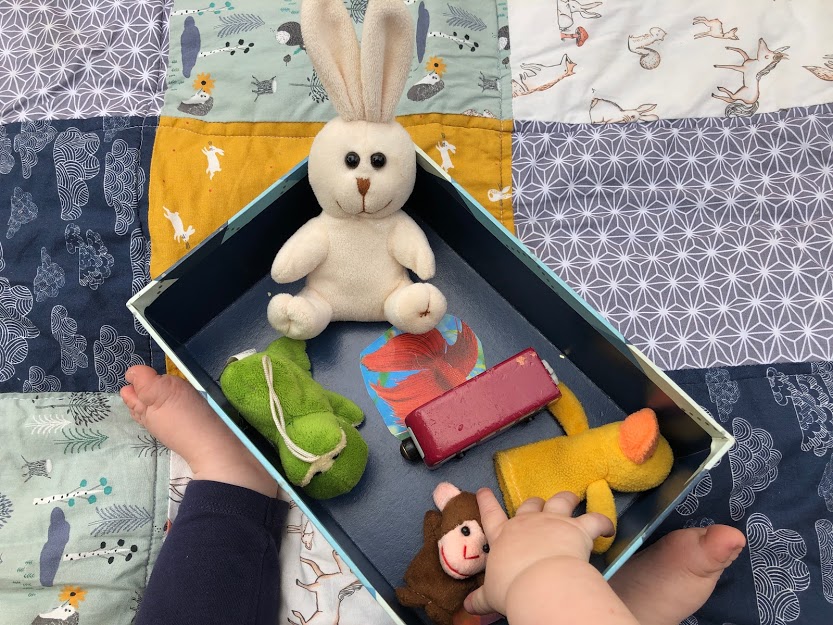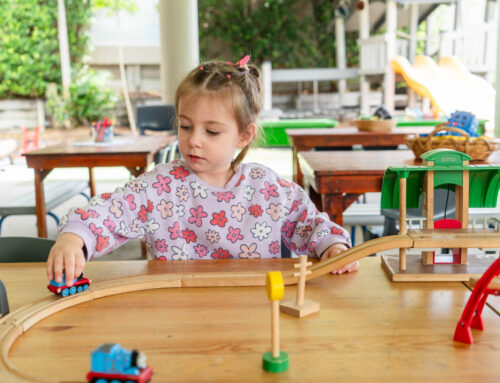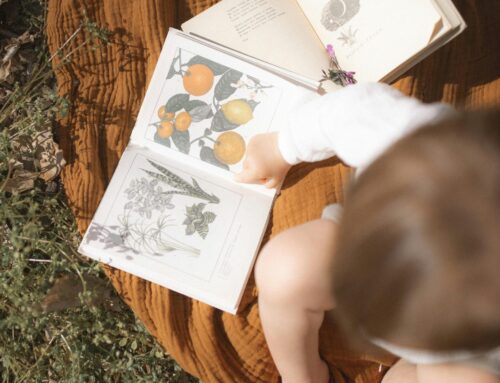By Emma Thomas Full-time mum, part-time blogger, with a background as a Kindy Teacher/Director
Christmas will be here before we know and I can’t wait! This will be my first Christmas as a mum so I want to make it special for my little one. As a Kindy Teacher I’m interested in gifts which are meaningful, long lasting and promote children’s development and learning. I know that my daughter will get many presents this Christmas, so I have decided instead of buying yet another toy, I will make something for her – a song box! A song box is a box (obviously) filled with different items to act as prompts, which inspire songs and rhymes to share with your child. For example, a bus for “The Wheels on the Bus”, or a star for “Twinkle, Twinkle Little Star”.
Over my years as a teacher, babysitter, aunty and now as a mum, I have seen time and time again how well children respond to music, songs and rhymes. Music can grab their attention, improve their mood, calm or excite them. I love using music with children of all ages as it promotes strong development across many of their key learning areas.
The benefits of music, songs and rhymes for children’s development has been widely documented, and I have included some links below if you would like to dive further in (I personally loved researching for this blog!). But if you only have a few minutes before you need to dash off, here is a short summary of some of the benefits that I have observed during my work with children. (Or skip to the end to see how to make your own song box!)
Verbal/Linguistic Development
Repetitive, shared language interactions form the basis of speech and understanding for babies and young children. Using the same pattern of words when speaking to your child provides the exposure needed to develop these neural pathways. Sharing repetitive songs and rhymes is an excellent way to do this and fun for everyone
Early Reading Skills
Learning songs and rhymes will help your child to hear the different sounds that make up words. As your child hears these songs regularly and learns to repeat them, they will expand their vocabulary and develop their understanding of rhyming words. Memorisation of simple rhymes and songs in the early years correlates with greater success in reading behaviours in primary school.
Building relationships
We all know how critical strong attachments are for young children. Having regular routines which include songs and rhymes helps to further build these relationships. Music is a strong memory anchor – think how you are transported back to your high school years when you hear a certain song played! For children linking positive experiences and relationships with songs will deepen the relationships and allow them to recall feelings of being loved and cared for when they hear these songs.
Gross and Fine Motor Development
Music provides us with the opportunity to practise gross motor skills (doing the action to ‘Teddy Bear, Teddy Bear, Turn Around’) and fine motor skills (the finger play for ‘Incy Wincy Spider’). Providing lots of opportunities for your child to develop their gross and fine motor skills through play in the early years will set them on the right path for formalised learning in primary school.
Learning Across Domains
Sharing songs and rhymes with your child promotes their cognitive development in many areas. There is a whole genre of children’s songs dedicated to mathematical concepts like counting, addition and subtraction (5 Little Ducks, The Apple Tree, Once I Caught a Fish). You can also use songs to talk about the weather (Incy Wincy Spider), experiences like going to the doctor (Miss Polly had a Dolly), animals (Old MacDonald) and much more!
Creating your own ‘song box’
Choose something to hold your items, it can be as large or as small as you like. A cardboard present box from the cheap shop works well, or you could be more creative and reuse an old jewellery box or wooden chest.
Pick a few of your child’s favourite songs and find a prop to represent each one. A physical object is best, however a laminated picture will also work if you’re struggling to find an appropriate item.
These are some of our favourites:
- ‘The Wheels on the Bus’ – a toy bus
- ‘Twinkle, Twinkle’ – a plastic star
- ‘5 Little Ducks’ – a duck finger puppet
- ‘Little Peter Rabbit’ – a cuddly rabbit
- ‘Galumph Went the Little Green Frog’ – a frog
- ‘I’m a Little Teapot’ – a small teapot
- ‘Incy Wincy Spider’ – a toy spider
- ‘Teddy Bear, Teddy Bear, Turn Around’ – a small teddy
- ‘Miss Polly Had a Dolly’ – a toy stethoscope
- ‘Row Your Boat’ – a plastic boat
- ‘5 Little Monkeys Jumping on the Bed’ – a monkey puppet
- ‘Open, Shut Them’ – a picture of hands
Make using the song box a special activity which you share with your child. Keep the song box up high but visible, then take the take time to sit down together without any distraction and open the box! Take it in turns to choose and sings the songs and rhymes. Nursery rhymes are so short that you only need to spend 5 or 10 minutes every few days to create lasting memories for your child.

Once your child knows all the songs from the box you can continue to add new props, but remember, children love repetition so will probably want their favourites again and again!
A song box is a special, personalised present that you can make for any child in your life. You can adapt it to the age level and interests of each child and put in as many song prompts as you like. I hope you love your song box as much as my daughter and I love ours!
Further Reading
The Importance of Music in Early Childhood. by Lili M. Levinowitz – https://www.musictogether.com/about/research/research-based-program/importance-of-music-in-early-childhood
Children’s brains develop faster with music training. By Emily Gersema – https://news.usc.edu/102681/childrens-brains-develop-faster-with-music-training/
Does your child have music hiding in their soul? By Maggie Dent – https://www.maggiedent.com/blog/does-your-child-have-music-hiding-in-their-soul/
World Nursery Rhyme Week – https://www.worldnurseryrhymeweek.com/
Extra Ideas
- If you have a large enough box, you can add some musical instruments and dancing ribbons or scarves! I always find drums, bells and castanets to be popular. I would also recommend a couple of egg shakers as these are a little quieter for those times when you’d like to turn the volume down.
- Think about making your own musical instruments! A saucepan and wooden spoon, a water bottle filled with rice or pasta, wooden rulers or pencils for tapping sticks or cardboard tubes for a didgeridoo.






